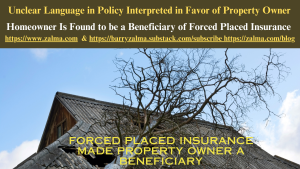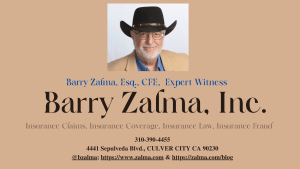Unclear Language in Policy Interpreted in Favor of Property Owner

See the full video at https://rumble.com/v4pzy46-unclear-language-in-policy-interpreted-in-favor-of-property-owner.html and at https://youtu.be/1N3KeQW1ZhQ
Post 4782
Keith Rath was unhappy with Arch Insurance Company over coverage for damage from the Derecho (windstorm) that hit Cedar Rapids in 2020. Rath’s bank holding a security interest in his home contracted with Arch to obtain a force-placed policy after Rath’s homeowners insurance lapsed. When Rath sued Arch for breach of contract and related claims, Arch argued that he had no right to sue because Rath was not an intended third-party beneficiary of the contract between Arch and the bank.
Keith Rath and Dennis Faltis v. Arch Insurance Company, No. 23-0157, Court of Appeals of Iowa (April 10, 2024) read the full policy and found the language of the policy gave Rath an interest in the proceeds of the insurance policy.
FACTS
The bank is Rath’s lender for a loan secured by his home. At some point, Rath let his homeowners insurance lapse in violation of the terms of the loan agreement.
When the bank learned of the lapse, it notified Rath that the insurance it bought might be “significantly more expensive than the insurance” he could obtain himself and might provide less coverage than such a personal policy. Rath then began paying monthly premiums for this insurance to the bank.
THE INSURANCE CONTRACT
The policy stated that Rath, as the “Borrower,” “has no interest in this policy” yet included an endorsement expressly giving Rath a benefit. That endorsement provides that while Rath “is neither a Named Insured nor an additional named insured under the policy,” he “shall be considered an additional loss payee only as respects amounts of insurance over and above the interests of” the bank in his home. The Court of Appeals concluded that there was no possible purpose for this endorsement besides providing a benefit to Rath.
The policy warns in a general statement on its cover pages that it does not “provide coverage for the Interest or equity of the Borrower.” It later defines the “Named Insured” as “the creditor, lending institution, company, or person holding and/or servicing the Mortgagee Interest on the Described Location.” And it expressly confirms that “[t]he Borrower is not a Named Insured under this policy and no coverage is provided, either directly or indirectly, to the Borrower.” The policy’s default text also defines the Borrower and then makes abundantly clear: “The Borrower has no interest in this policy.”
But that last line was stricken and replaced with text from an Amount-of-Insurance endorsement that the parties added to the policy. So rather than having “no interest in this policy,” under the endorsement: “The Borrower is neither a Named Insured nor an additional named insured under this policy; however, the Borrower shall be considered an additional loss payee only as respects amounts of insurance over and above the interests of the Named Insured in the Described Location.”
THE STORM
In August 2020, a Derecho [A widespread, long-lived wind storm that is associated with a band of rapidly moving showers or thunderstorms. Although a derecho can produce destruction similar to the strength of tornadoes, the damage typically is directed in one direction along a relatively straight swath.] swept across Iowa, hitting Cedar Rapids especially hard. A tree fell on the house and it sustained wind damage. Among other damage, Rath believes most of the roof was damaged, along with siding, windows, and electrical systems. And so, Rath reported the damage to the bank, which made a claim to Arch under the policy. After Arch’s adjuster agreed that “the dwelling sustained damage due to wind and tree impact,” Arch decided that there was a covered loss of $1,222.37 and mailed a check for that amount directly to Rath.
THIS PROCEEDING
About a year after the storm, Rath sued Arch over this dispute. Rath claimed that Arch breached the insurance contract by denying proper payment for his losses and refusing to engage in the appraisal process under the policy. He also brought claims of bad faith and unjust enrichment and sought declaratory and injunctive relief related to his rights under the policy and the appraisal process.
Rath appealed the district court’s grant of summary judgment and dismissal of all his claims.
Interpreting an insurance policy is a legal question. Rath’s main argument that he is an intended third-party beneficiary of the insurance policy relies on the Amount-of-Insurance endorsement. The court of appeals agreed with Rath that the endorsement manifests an unambiguous intent to benefit him. Indeed, the Court of Appeals concluded that there is no other possible intent for contract provisions increasing the coverage above the bank’s interest and giving Rath a right to payment.
Saying that Rath is not a “Named Insured nor an additional named insured” is not the same as saying he is not a third-party beneficiary. By deleting that text-while also increasing the coverage above the bank’s interest and giving Rath a right to payment-the endorsement leaves little doubt that indeed Rath does now have an interest in the policy. He is an intended third-party beneficiary.
The parties fought a preliminary legal skirmish on the limited ground chosen by Arch-whether Rath is a third-party beneficiary under the contract. And because Arch lost that battle, the fight must now go on.
Poor wording in an insurance policy will often result in strange and confusing court decisions. The court found, because a clause allowed Rath to recover for losses over the interest of the bank made him a third party beneficiary. What the Court of Appeal ignored was that his interest was only available after the full interest of the bank were paid. The loss was only $1,222.37, much less than a mortgage loan. Since the loss was less than the amount of the banks interest, Rath had no right to that money as a third party beneficiary since the loss was less than the interest of the bank.
 (c) 2024 Barry Zalma & ClaimSchool, Inc.
(c) 2024 Barry Zalma & ClaimSchool, Inc.
Please tell your friends and colleagues about this blog and the videos and let them subscribe to the blog and the videos.
Subscribe to my substack at https://barryzalma.substack.com/subscribe
Go to X @bzalma; Go to Newsbreak.com https://www.newsbreak.com/@c/1653419?s=01; Go to Barry Zalma videos at Rumble.com at https://rumble.com/c/c-262921; Go to Barry Zalma on YouTube- https://www.youtube.com/channel/UCysiZklEtxZsSF9DfC0Expg.
Go to the Insurance Claims Library – https://lnkd.in/gwEYk.
Like this:
Loading…







